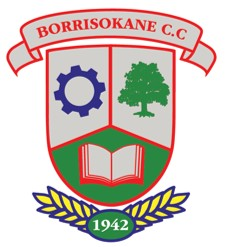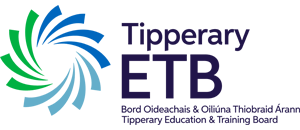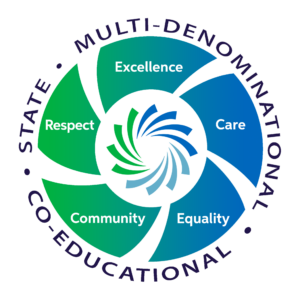Wellbeing is now officially recognised as an important feature of the lives of students, through the new Junior Cycle. The Framework for Junior Cycle (2015) will help further embed wellbeing in our school policies, together with our school’s culture and ethos and will all contribute to making wellbeing more visible to our students.
View our Wellbeing Policy
Wellbeing is present when a person realises their potential, is resilient in dealing with the normal stresses of their life, takes care of their physical wellbeing and has a sense of purpose, connection and belonging to a wider community. It is a fluid way of being and needs nurturing throughout life.
Our Vision in Borrisokane Community College is to create an environment where students want to come to school because they feel safe, connected, supported, cared about, valued and challenged, we aim to create an environment where there is an acceptance of all, along with a celebration of difference. We hope that students will leave Borrisokane Community College proud, resilient, respected and respectful of others, able to be responsible for their actions and capable of building positive relationships with a range of people.
The wellbeing of all is at the heart of what we do in Borrisokane Community College. We define Wellbeing as care of the individual in the school to ensure they are contented, healthy and successful. This is reflected in our Mission Statement and School Charter.
A whole school approach is adopted in Borrisokane Community College which involves all members of the school community engaging in a collaborative process of change to improve specific areas of school life that impact on wellbeing.
Commitment to Wellbeing for all- All relationships in our school are built on respect.
Charter Displayed in all classrooms.
- R – Respond to others with kindness
- E – Establish friendships with all classmates
- S – Share responsibilities
- P – Prepare for class
- E – Expect the best of yourself
- C – Co-operate with others
- T – Talk appropriately to peers and adults
Well-being and the Curriculum
In Junior Cycle students have classes in S.P.H.E, C.S.P.E, P.E., and Well-being (Guidance Related Learning)
At Senior Cycle well-being is facilitated in the curriculum through – SPHE, P.E. and Guidance.
Indicators of Well-being

To help ensure everyone – students, parents, and teachers – have a collective understanding of what Wellbeing means, we reference the six indicators of wellbeing as a guiding tool.
Wellbeing Indicators Explained
Active
Am I a confident and skilled participant in physical activity?
How physically active am I?
Responsible
Do I take action to protect and promote my wellbeing and that of others?
Do I make healthy eating choices?
Do I know where my safety is at risk, and do I make the right choices?
Connected
Do I feel connected to my school, my friends, my community, and the wider world?
Do I appreciate that my actions and interactions impact on my own wellbeing and that of others, in local and global contexts?
Resilient
Do I have the coping skills to deal with life’s challenges?
Do I know where I can go for help?
Do I believe that with effort I can achieve?
Respected
Am I listened to and valued?
Do I have positive relationships with my friends, my peers, and my teachers?
Do I show care and respect for others?
Aware
Am I aware of my thoughts, feelings and behaviours and can I make sense of them?
Am I aware of what my personal values are, and do I think through my decisions?
Do I understand what helps me to learn and how I can improve?
The 4 key areas for Wellbeing Promotion are
Wellbeing Policy Statement and Framework for Practice
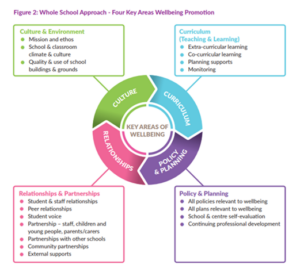
Further Information available using the following link
Wellbeing Policy Statement and Framework for Practice
Wellbeing/Mentoring Committee
Borrisokane Community College has a dedicated wellbeing/mentoring committee consisting of staff and students. Its aim has been to make Wellbeing an integral part of daily life by enhancing whole-school commitment to student Wellbeing and student welfare. This is facilitated by creating an environment where students felt safe, connected, supported, cared about, and challenged. The work of our Wellbeing Committee has ensured our students feel proud, resilient, and respectful of others, they take responsibility for their actions and can build positive relationships with a range of people.
The committee meets on a regular basis to co-ordinate activities and events to promote well-being and to create a Mentoring Session which takes place four times throughout the school year in response to the needs of our school community. A wellfest week takes place each year, with various activities including guest speakers and workshops.
Whole School Wellbeing Promotion
The promotion of whole-school wellbeing is central to all that we do in Borrisokane Community College. We are a center for learning in the heart of community who support and encourage a positive environment for students and staff, which in turn allows students’ academic achievement to evolve. Wellbeing education is a priority for us all and can be progressed through the School Self-Evaluation (SSE) process. SSE can also help a school to address the wellbeing challenges that arise for staff or learners. The adoption of a multi-component, preventative, whole-school approach is most beneficial in promoting wellbeing. This involves all members of the school community collaborating to change and improve specific areas of school life that impact on wellbeing.
Our SSE/School improvement plan focuses on Inclusion and aims to build student well-being and confidence so that teaching and learning may be enhanced.

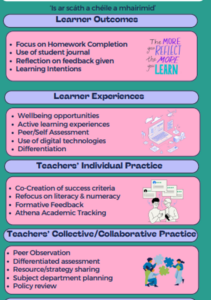
Promoting Wellbeing
To promote wellbeing in Borrisokane Community College, the following days and weeks are organised annually to educate students and promote positive mental and physical health:
- Wellbeing Wednesday’s
- Active Movement Breaks
- Random Acts of Kindness
- Friendship Week
- Steps Challenge
- Bonding Activities
- Antibullying Week.
- Stand Up Awareness Week
- Mental Health Awareness Day
- Internet Safety Day
- Wellfest Week
- Jigsaw – One Good School Initiative
Each of the above, combined with the curricular focus on wellbeing, are essential in helping each pupil engage with the indicators of wellbeing which include being active, responsible, connected, resilient, respected, and aware.
